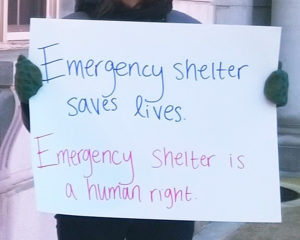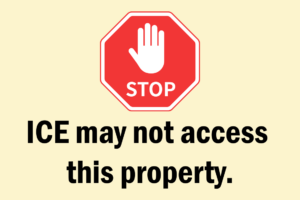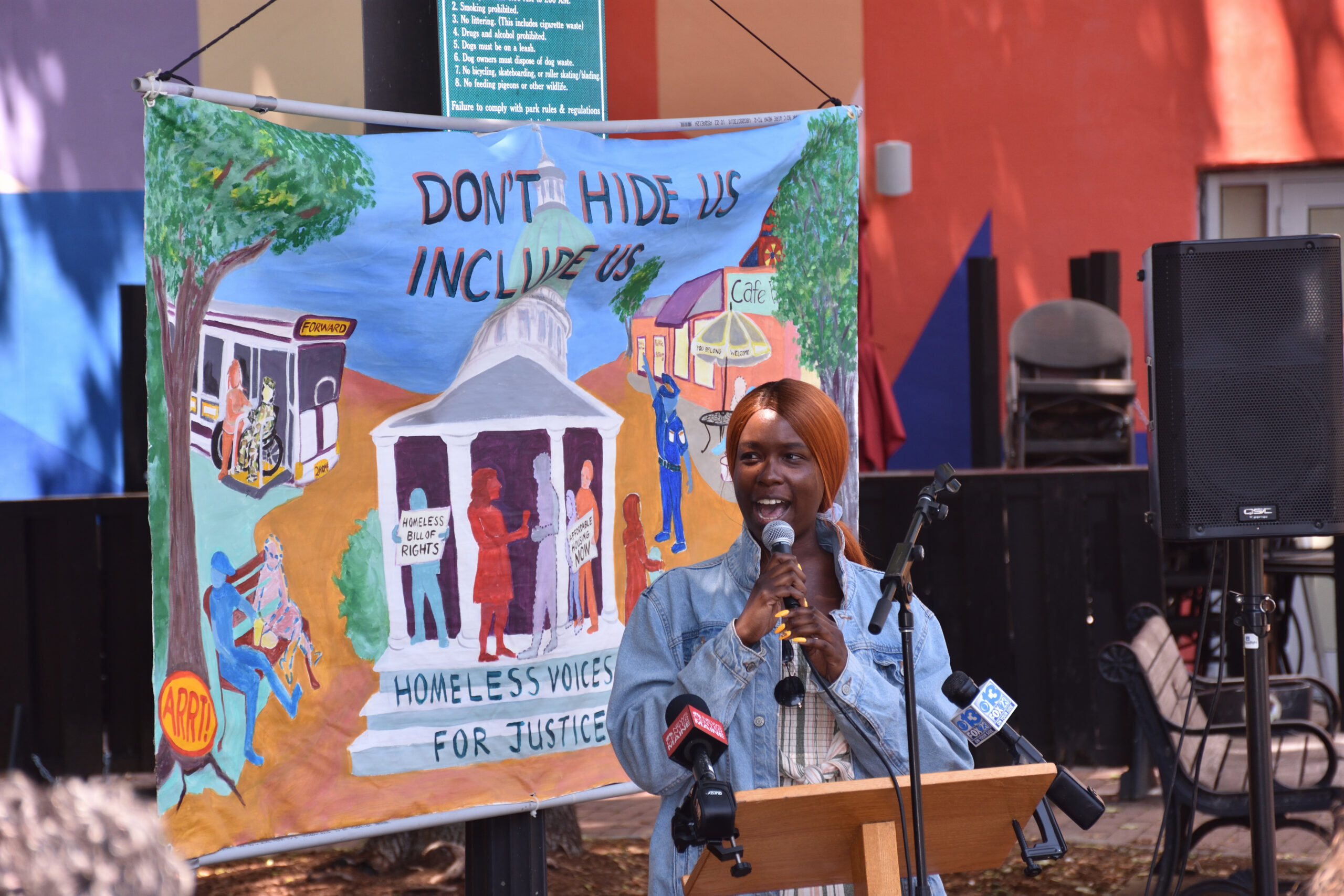“Please remember that our unhoused community members are humans. They’re part of our community and they’re our neighbors. They deserve compassion. They deserve safety. They deserve advocacy, and they deserve housing,” shared Portland City Councilor Victoria Pelletier at the 2023 Longest Day of Homelessness Sit-in organized by Homeless Voices for Justice. “They deserve resources. They deserve respect and they deserve human decency. What they do not deserve is to be demonized, chastised, judged, ridiculed, harmed, and laughed at by those privileged enough to have a place to live, a warm bed, food in the fridge, and a roof over their head.”
Homeless Voice for Justice hosted the 16th Annual Longest Day of Homelessness Sit-out on June 21, 2023, to bring attention to the dangers of being homeless in the sweltering heat of summer.
With those words ringing in our ears, the three recent deaths of people who were unsheltered and living in encampments are particularly hard to process. 28 people this year who were part of the homeless community in greater Portland have died so far in 2023. The causes of death have been varied – overdose, suicide, brain tumor, cancer – but they represent a tragic loss for our community. Every single one of these people was someone’s child, friend, or parent and every single one of these deaths should be devastating to all of us.
When the shelters are full and no beds are available, people do not just disappear; they go further into the margins, further away from services, or further into places that are unsafe. On average, the life expectancy of people who are homeless is about 28 years shorter than that of people who are housed. Chronic illness or untreated disease, violence, substance use, mental health issues, broken systems, and more all make people who are unhoused much more vulnerable than their housed peers.
So, what can we do to stop these deaths? Our recent op-ed in the Portland Press Herald outlined solutions to this crisis that we are in right now.
- Maine must commit to providing the most basic of needs: a roof over every head. There are more people who need shelter and a bed than there are beds available. Shelters are our first line of defense against unsheltered homelessness.
- Emergency shelters need consistent funding to keep their doors open. Current state funding covers just 24% of shelter costs. Increasing operating funding from the State to the emergency shelters in Maine will allow for us to maintain the existing shelter beds and to expand capacity and elevate professional services necessary to support this population. Earlier this week, recognizing the critical front-line service that shelters provide, the Appropriations and Financial Affairs Committee took a great first step by including one-time funding of $5 million for shelters across Maine.
- Maine must invest in the long-term solutions needed to end homelessness. Besides funding for shelters, we need more affordable housing and to move quickly on creating more Site-based Housing First programs across the state. We also need to expand services for physical and behavioral health and substance use disorders.
Hundreds of people in our community are doing their best to simply survive and meet their basic needs of food, shelter, and water. Preble Street and other social services providers are continuing to advocate for people who are unsheltered or living in encampments and or seeking asylum to have access to the supports necessary to promote their safety and dignity.
Councilor Pelletier also said at the Longest Day event, “we have a lot of work to do. And if you think that you can be doing more to support your unhoused community neighbors, you’re probably right.”
So, what can you do as an individual?
- Advocate. For more shelter beds and shelters, for long-term solutions, for more affordable housing in all Maine communities, and for kindness and empathy for our most vulnerable neighbors.
- Volunteer. Of course, we’d love to have you as a volunteer for Preble Street (sign up here!), but there also are many other organizations across Maine where you can make a difference in someone’s life.
- Support. From speaking up for the rights and humanity of our unsheltered neighbors and asylum-seekers to donating items critical for surviving outside (see requested items from Preble Street and Maine Needs) to providing critical support for the many nonprofit organizations like Preble Street who are filling the gaps, there is no limit to the ways you can make an impact.
Learn more

Take Action: Tell Maine to provide permanent funding for emergency shelters!
UPDATE FEBRUARY 24, 2026: Mainers experiencing homelessness need you to advocate for shelter funding now! After the public hearing and work session on the shelter funding bill earlier this month, the Housing and Economic Development Committee has tabled the bill and is scheduling another work session. We cannot let this bill die in committee! From York to

Preble Street testimony in support of permanent, sustainable funding for Maine emergency shelters
Maine needs and deserves safe, accessible, professionally run, and sustainable emergency shelters that can meet the needs of the growing number of individuals and families experiencing homelessness in our state. On Tuesday, February 10, 2026, shelter executive directors and staff from across the state went to Augusta to advocate for a sustainable funding source that

TAKE ACTION to Protect Maine’s Public Schools, Hospitals, Daycares, and Libraries from ICE
Tell your Maine legislators to support LD 2106! Increased presence of Immigration and Customs Enforcement (ICE) agents, as part of the dehumanizingly named ‘Operation Catch of the Day,’ is creating constant fear and anxiety for so many of our neighbors, leaving them scared to leave their homes, go to work, take their children to school, seek
